
The Vale of Glamorgan, locally referred to as The Vale, is a county borough in the south-east of Wales. It borders Bridgend County Borough to the west, Cardiff to the east, Rhondda Cynon Taf to the north, and the Bristol Channel to the south. With an economy based largely on agriculture and chemicals, it is the southernmost unitary authority in Wales. Attractions include Barry Island Pleasure Park, the Barry Tourist Railway, Medieval wall paintings in St Cadoc's Church, Llancarfan, Porthkerry Park, St Donat's Castle, Cosmeston Lakes Country Park and Cosmeston Medieval Village. The largest town is Barry. Other towns include Penarth, Llantwit Major, and Cowbridge. There are many villages in the county borough.

Cowbridge is a market town in the Vale of Glamorgan, Wales, approximately 12 miles (19 km) west of the centre of Cardiff.

Newport Civic Centre is a municipal building in Godfrey Road in Newport, South Wales. The civic centre, which is the headquarters of Newport City Council, is a Grade II* Listed building.

Cowbridge with Llanblethian is a community in the Vale of Glamorgan, Wales, which incorporates Llanblethian and the town of Cowbridge. It also covers the village of Aberthin to the northeast of Cowbridge. The population was 4,063 in 2011.

Llanblethian is a village in the Vale of Glamorgan in Wales which sits upon the River Thaw. It makes up part of the community of Cowbridge with Llanblethian, which consists of the village itself, the larger market town of Cowbridge and Aberthin.

Barry Council Office and Library is a local government building and public library located in King Square, Barry, Wales. The building, which was once the meeting place of Barry Municipal Borough Council, is a Grade II listed building.

The timeline of Cardiff history shows the significant events in the history of Cardiff which transformed it from a small Roman fort into the modern capital city of Wales.
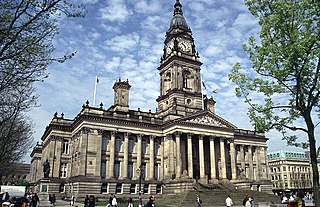
Bolton Town Hall in Victoria Square, Bolton, Greater Manchester, England, was built between 1866 and 1873 for the County Borough of Bolton to designs by William Hill of Leeds and George Woodhouse of Bolton. The town hall was extended in the 1930s to the designs of Bradshaw, Gass and Hope and has been designated a Grade II* listed building by English Heritage.
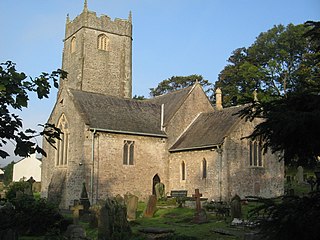
The Church of St John the Baptist is a medieval church in Llanblethian in the Vale of Glamorgan, south Wales. Believed to have been built in the 12th century, the church boasts an unusual tower, consistent with the style more common in the south west of England. It underwent extensive restoration in the late 19th century, undertaken by C. B. Fowler of Cardiff. The Church of St John was listed as a Grade I building on 22 February 1963.
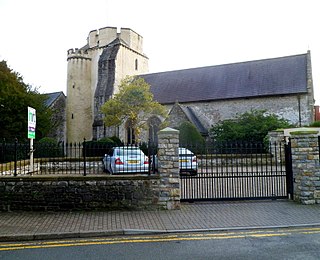
The Church of the Holy Cross is a medieval church in Cowbridge in the Vale of Glamorgan, south Wales. Initially a chapel of ease to Church of St John the Baptist, Llanblethian of Cowbridge as a medieval market town. Believed to have been built in the 13th century, the church has an unusual tower design. It has undergone several restorations including one by John Prichard in 1850–52. The Church of the Holy Cross was listed as a Grade I building on 12 May 1963.

Cowbridge is the name of an electoral ward in the Vale of Glamorgan, Wales, which covers its namesake town of Cowbridge as well as the neighbouring villages of Llanblethian and Aberthin and the communities of Llanfair and Penllyn. The ward elects three county councillors to the Vale of Glamorgan Council.

Wokingham Town Hall is a municipal building in Wokingham, Berkshire, England. The building is the meeting place of Wokingham Town Council and is a Grade II* listed building.

Worthing Town Hall, or New Town Hall, is a municipal building in Chapel Road, Worthing, West Sussex, England. The town hall, which is a meeting place of Worthing Borough Council, is a Grade II listed building. Located at Chapel Road in the centre of Worthing, it was opened in 1933 and built in a neo-Georgian style to designs by Charles Cowles-Voysey. Containing offices and a Council chamber it replaced Worthing's Old Town Hall as the administrative centre, a building that had been the home of Worthing's local authority from 1835 and was demolished in 1966. To the rear and west lies the Assembly Hall, built in 1935, also to designs by Cowles-Voysey. To the south lies the Worthing Museum and Art Gallery, originally built as a Carnegie Library.
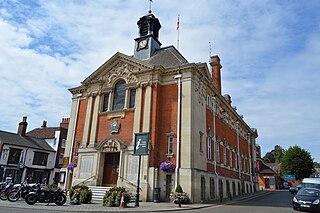
Henley Town Hall is a municipal structure in the Market Place in Henley-on-Thames, Oxfordshire, England. The town hall, which is the headquarters of Henley Town Council, is a Grade II* listed building.
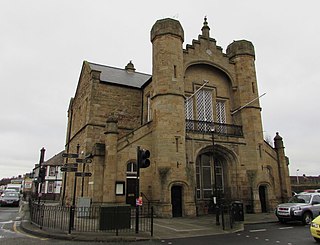
Flint Town Hall is a municipal structure in the Market Square, Flint, Flintshire, Wales. The town hall, which is the meeting place of Flint Town Council, is a Grade II listed building.

Tavistock Town Hall is a municipal building in Bedford Square, Tavistock, Devon, England. The structure, which remains the main venue for civic events in the town, is a Grade II listed building.

Helston Guildhall, formerly Helston Town Hall, is a municipal building on Market Place, Helston, Cornwall, England. The structure, which is the meeting place of Helston Town Council, is a Grade II* listed building.
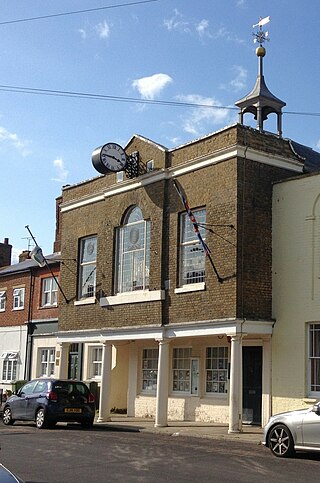
Queenborough Guildhall is a former municipal building in the High Street in Queenborough, Kent, England. The structure, which is currently used as a museum, is a Grade II listed building.

Brecon Guildhall, is a municipal building in the High Street, Brecon, Powys, Wales. The structure, which is the meeting place of Brecon Town Council, is a Grade II listed building.

Bradninch Guildhall is a municipal building in Fore Street, Bradninch, Devon, England. The structure, which is now used as a community events venue, is a Grade II listed building.






















